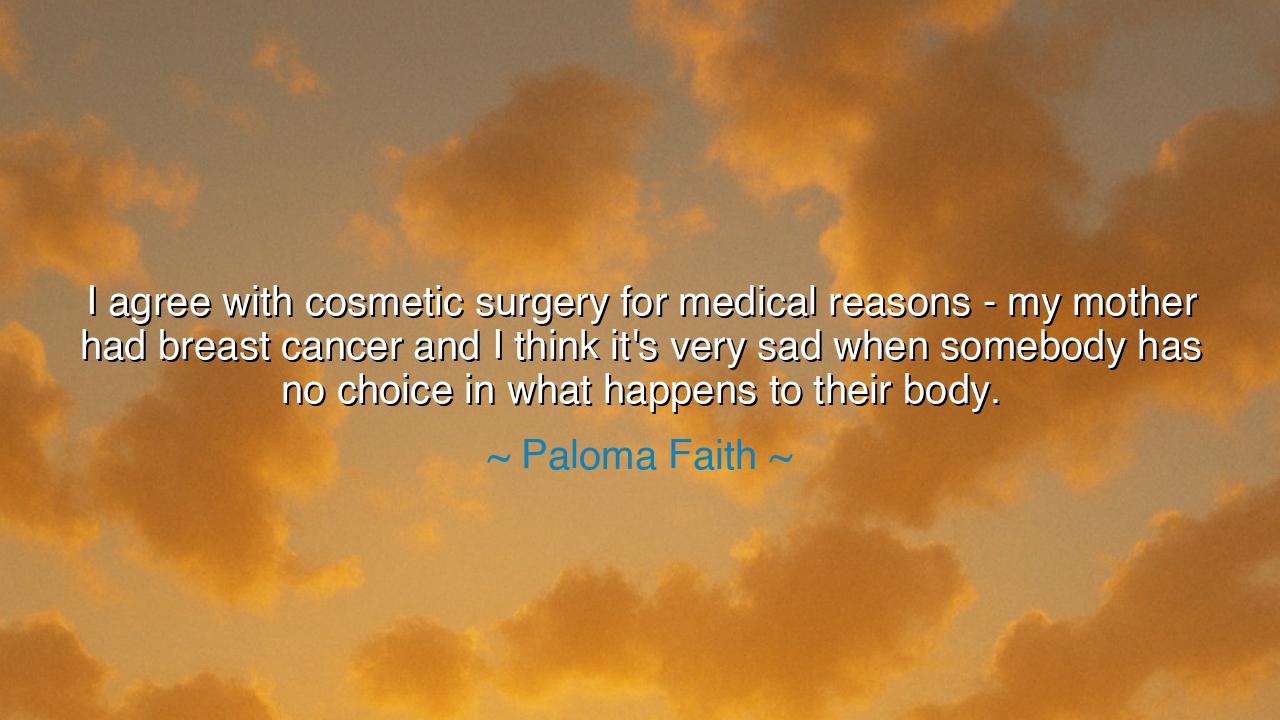
I agree with cosmetic surgery for medical reasons - my mother had
I agree with cosmetic surgery for medical reasons - my mother had breast cancer and I think it's very sad when somebody has no choice in what happens to their body.






Hear the words of Paloma Faith, spoken with the weight of love and sorrow: “I agree with cosmetic surgery for medical reasons—my mother had breast cancer and I think it’s very sad when somebody has no choice in what happens to their body.” In this reflection lies the recognition of suffering and dignity, of the deep injustice that comes when illness steals not only health but also identity. Her words are not a frivolous defense of vanity, but a compassionate call to restore wholeness when fate has torn it away.
The body is more than flesh—it is the vessel of the soul, the dwelling of one’s spirit, the form through which we meet the world. When disease such as breast cancer strikes, it does not only wound the flesh; it wounds the sense of self, altering how one is seen, and how one sees oneself. Faith speaks from the raw memory of her mother, whose struggle revealed this cruel truth. To her, the possibility of cosmetic surgery for healing is not indulgence, but mercy—an attempt to give back to the human spirit what sickness has stolen.
The ancients, too, knew the sacredness of the body. In Greece and Rome, statues were crafted not merely to show beauty, but to reflect wholeness, balance, and harmony. Yet when war or illness disfigured the flesh, it was not seen as shameful, but as a mark of tragedy that deserved compassion. In our time, medicine grants what marble could not: the chance to restore form as well as function, to grant dignity where cruelty of fate has left scars. Faith’s words remind us that this is not vanity, but reverence for the humanity within.
History gives us poignant examples. Consider the soldiers of the Great War, whose faces were shattered by battle. In those days, pioneering surgeons labored to reconstruct them—not to flatter, but to heal, to allow them to walk again into society without bearing constant judgment or rejection. It was not about beauty; it was about dignity, about restoring the right to live without shame. In the same way, Faith’s defense of medical cosmetic surgery springs from compassion for those who lose control of their bodies through no fault of their own.
There is a deeper wisdom in her sorrow: the recognition that choice is sacred. When one chooses freely to change their body, it is one matter; but when disease dictates, when the body is taken and reshaped by suffering, then there is tragedy. To offer the possibility of repair is not indulgence but justice. This is why Faith calls it sad—for to live without choice in one’s own flesh is to be denied a fundamental part of human freedom.
The lesson for us is this: never judge harshly the paths people take to reclaim their dignity. Show compassion before criticism, for you do not know the battles they have fought within their skin. Support those who must endure the cruelty of disease, and honor their right to seek wholeness again. And in your own life, cherish the freedom you have over your body, treating it not with disdain or shame, but with reverence and gratitude.
So let Paloma Faith’s words stand as a reminder: the true purpose of medicine and even of cosmetic surgery is not vanity, but healing; not perfection, but restoration of dignity. When sickness or sorrow robs someone of choice, let us stand with them, offering understanding and compassion. For the body is sacred, and to help another regain harmony with their own form is among the noblest acts of love. In this truth lies both wisdom and hope—that though we cannot always prevent tragedy, we can help one another reclaim the light that tragedy seeks to extinguish.






AAdministratorAdministrator
Welcome, honored guests. Please leave a comment, we will respond soon